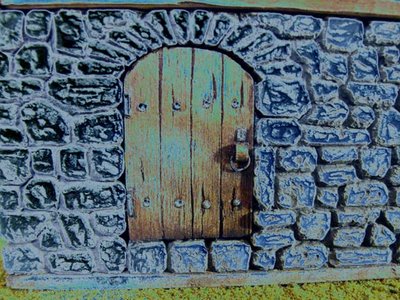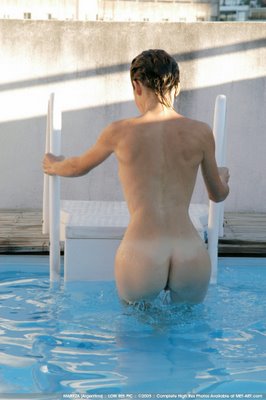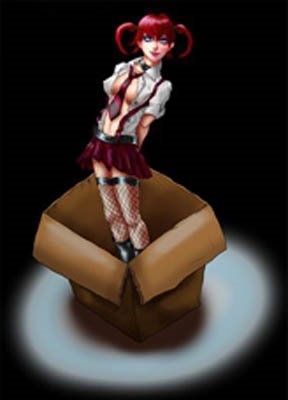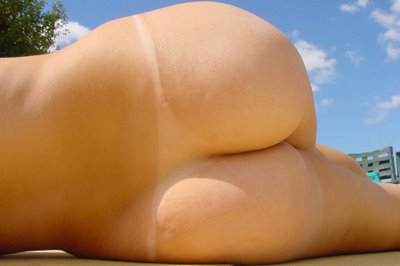Portals to (Bliss)

... the Freudian unconscious is situated at this point, where, between cause and that which it affects, there is always something wrong. the important thing is not that the unconscious causes neurosis -- of that one Freud can quite happily, like Pontius Pilot, wash his hands. Sooner or later, something would have been found, humoral determinates for example -- for Freud, it would be quite immaterial. For what the unconscious does is to show us the gap through which neurosis recreates a harmony with a real -- a real that may not be determined.
In the gap, something happens. Once this gap has been filled, is the neurosis cured? After all, the question remains open. But the neurosis becomes something else, sometimes a mere illness, a scar, as Freud said -- the scar, not of the neurosis, but of the unconscious. ... What does he find in the hole, in the split, so characteristic of the cause? Something of the order of the non-realized.
- Jacques Lacan, “The Freudian Unconscious and Ours,” ifrom The Four Concepts of Psychoanalysis: The Seminars of Jacques Lacan, Book XI, ed. Jacques-Alain Miller, transl. Alan Sheridan

FALL INTO THE (GAP)
Sept. 5
Beyond the last sentence
lie dragons. Do they not?
Pure wilderness of
adulterous blue,
raw ocean smashing
against my hips,
thrashing tidal
spasms out my pen.
The whole world
nubile and wide,
pliant in liquid
greed for my sin,
for this sine
to thrust through
its sinuous wave,
begging this red
poem to begin and
never end, not
on any bed, my
every trope hurled
at that need in
burbles of white bliss
too seminal to
sate or rend
or by stars forfend.
He is hardest where
she hides her
orchid lair -- smells
it lush and swoony-
sweet, suffusing
the night’s atmosphere
with the blossom’s
peal of venusian
cream. His cock
aches to its stone-
veined length
desperate to reach
penetrate that dewy
deep in her where
his own heart’s night
beckons, fold by
spreading fold.
Without the
itch that mads us with
a dream’s curved
bitch in heat,
I would not dare
exceed my town’s
last light, transgressing
tangled brush and
brake in love’s
most dangerous name,
my day around
my ankles, my
mouth a sing-song
ocean pouring
vaster seas in
every broken seam
and lack where
she is everything
crying Yes
forevermore.
And yet and
still I’m just
sitting on this
big white chair
two hours south
of dawn, writing
down again and
yet and still
again this next
haul of stranger
stronger fish.
Arisen from salt
leagues I’ll never
name or scour
I yet and still
enjoy in greater
measure this
paper miniscule
of sex like a dragon
of no ending whirls
beyond the gap
where he forever
and insatiably devours
something essential
red and fragrantly
hot -- the object
of God’s appetite,
the true blue mortar
of this abysmal hour.

At first, the unconscious is manifested to us as something that holds itself in suspense in the area, I would say, of the unborn. That repression should discharge something into this area is not surprising. It is the abortionist’s relationship to limbo.
Certainly, this dimension should be evoked in a register that has nothing unreal, or dereistic, about it, but is rather unrealized. It is always dangerous to disturb anything in that zone of shades, and perhaps it is the analyst’s role, if the analyst is performing it properly, to be beseiged -- I mean really -- by those in whom he has invoked this world of shades, without always being able to bring them up to the light of day. One can never be sure that what one says on this matter will have no harmful effect.
... It is not without effectd that, even as public speech, one directs one attention at subjects, touching them at what Freud calls the navel -- the navel of the dreams -- he writes, to designate their ultimately unknown centre -- which is simiply, like some anatomical navel that represents it, that gap of which I have already spoken.
-- Lacan, ibid.

BLUE AND GOLD
Sept. 8
Longing and desire
are the two doors of
my heart, the north
and southern portals
of a vast cathedral
through which stars
and oceans stream.
Sex is the beach
my love can never reach,
its dunes and surf
and mistral breeze
collaborating with
the ruse between
knees I’ll never
plunge the depths of
nor fully whet
this feathered nib
to say what she
concluded when
she tensed and
cried Yes and
sighed my name.
Longing is a more
complex lysis
in this dream,
the sound of broken
waves ebbing
their distaffs from
the shore,
first light’s sad welcome
of her bed empty
of her; it is that via
negativa in my
bee-loud head
which betrays love
with its name,
never satisfied in
the sots and sates
of those nights I
marginned her,
never more empty
as when she
is finally at peace
with me, never more
fulfilled as when
she’s gone. Desire
and longing are
portal ventricles
which flap as wild
as beached fish,
desperate for
waters which poured
out long ago
when I was beached
like Jonah to this
world and bid
to merge blue
curvatures
with the gold
light of their god,
to woo a seeming
beautiful into the bed
a broken truth.
How many times
have I got naked
that sea-streaming
ghostly muse, writing
with my body
the next name
of her lost
beach, retelling my
first story amid
the wild crashings
of an indifferent sea,
beneath a canopy
of coldly distant stars,
the whole massed
universe of skin
pressed up against
me in every Other
way, for reasons
not my own, with
eyes so focused
behind and above
me that my voice
sounded like white
noise in the clinch,
no diving devilfish
at all, just a
a creaking hinge
to some truer
door badly in
need of grease
or sense or mojo.
The poems I came
to write are paper
phalloi of that
indecent pride
which keeps both
doors below oped
wide in worship
of the poles by
which I compass
God: Songs both
notes and reconnoiterings
of those aches
which mad
and make a man,
the blue and
gold ends of
Her dream’s
divining rod.

THE DEVIL’S DOOR
Saxon churches had
a Devil’s Door facing
north: Some say it was
where the door
pagans would enter
that still reached
the old built-over gods:;
Your bias was thus
known by which door
you entered: Some
Sussex people believed
that the Devil lay in
wait outside that north
door to damn the soul
of any poor Christian
foolish enough to
egress that way: Today
you’ll find most of
those north doors
permanently blocked:
Recall that Oran
travelled north from
where he was buried
in the Columba
abbey footers, descend-
ing north into the
icy regions of Hell:
This Well egresses
or drills north, dooring
pole-wraiths & welling
a witch’s tit brine:
At the end of my
workouts at the gym
I ease down into a
cold splash bath and
remain there some 5
minutes applying
physic to sore knees
& back with 48-degree
water: Seal-cold waters,
North Sea waters:
Survivors of the wreck
of the Titanic died of
hypothermia in waters
like this, blueing into
hard clumps of
supplication & knocking
into each other like
billiard balls: When I
can stand the cold
no more I submerge,
& hang for a moment
in that wild cold
to pray my Devils
Door prayer -- “By
the Rock of Saint
Columba sworn” I
intone deep inside
then burst up like
a narwhal glad to
death for the sky:
Upon Oran’s cold-
splashed bones I build
this low chapel: Through
his Door I egress
and transgress this
daily vowel movement:
I am baptized by
his brute underworld
swim: Harrowed by
the ice-lords and snow-
queens found there
isle to polar isle: Up
beyond Skye and
Bute and Callanish,
way north of the
Orkneys where Thor
hammers & hearkens
his infinite gale: Hell’s
balls bell a thrall of pure
icy fire: Pealing that
freezing foam ghosting
wave-beards where
demiurges roam:
North Door with your
high brow of skulls:
Where the black
apparition lies in wait
to confound & ferry us
home: I’m writing runes
today on the Devil’s Door
for all who would transgress
here in the pedigree of
most ancient stone: Down
and north, sound the
buckets down to that
dark island where the
bones of the fathers pack
the loam: Marrow this
song with those cold ribs
& ghost peckers: They
are the rock upon which
all churches we know
grow:For those who would
worship here you must
use the queer door so fair
and foul which opens to
an upside down demesne
of backassed whirl:
Heaven’s down here, folks
-- below -- it’s where the
angels all go when pieties
fail and Moby’s gut is
is pink beehive cell: Not so,
sighs the wind outside
the Devil’s Door: Not
Here: The ice is clear:
Blue imps flicker like
wattage in the polar
night, singing low
in the glacial undertow:
Not here, tragic son,
Not here. Welcome home.
Southbound
from “A Breviary of Guitars,” 2000
The Present
1.
Those days in
Summer 1979
are exactly 20
years from these
days where
each is a petal
from a centrally
formed bud
of marriage,
mortgage, career:
Sitting here on
the usual 5 a.m.
stage with a
cup of coffee and
Buster purring
on the floor
by my feet
-- the phrase
is now Homeric,
a worn narrative
button: I look
back on those days
almost mythically,
relics of someone
else’s crazy life,
the stupidity of it
accepted only when
I let it go:
A madness that
required treatment,
meetings, alembics
long closure: But
there’s also jealousy
for the carefree
swagger of those
days, the easy
random humps
with soft lumps
long before fidelity
and AIDS: I who
now have grown
accustomed to
the depths envy
my shallow
gluttony for
God’s plenty
of bra sizes
and panty colors:
I’m wakened
and roused by
a gauze bestiary
of sighs and
ululations:
I’ve traded all that
for this, knowing
sadly and at length
that nothing really
happens without a
stable base and
practice, lots
of practice:
I learned to
write and study
in rooms as this
for the past
10 years.: I’ve
filled tall bookcases
with books I have
loved and more
than 50 journals
of prose and poetry
iterating
reiterating
bitching
swooning
dreaming
making
masking;
I’ve spent years
just sitting in a
chair at first
light holding
a pen: That’s
what love
is in this house
with my wife has
become: substantial,
secure, roots deep
enough for
the losses we
must now sustain
-- James in his
grave & our parents
aging, Buster
nearly giving
up ghost,
relenting for
this little while:
We start each day
in bed our bodies
gentle and easy along
each other from
long familiarity,
passion now a treat
a couple times
a month but
love our daily
free feast:
Back then I could
not have fathomed
such grounded
motions: My itches
and furies always
bled for the
quickest, most
fragrant cure:
Unfettered lusts
were like a swarm
of bees and
I was the hive,
my balls my
brain my hands
my guitar all
tending the
Queen Bee in
her vault: endlessly
stung by Cupid
and galloping
on the dolphin
through
ancient sea-roads
with the next
night knocking
from the next door,
calling me south:
2.
I suspect now
that my rock
and roll fantasies
were not
simply spun
from some
pop-cultural
jukebox
of popstar
fame &
pussy that
every teenaged
boy would
gladly plop
his inheritance
into: I think
I had by the
distilled
into a specie
of divine madness
that would
eventually rouse
me here:
I fell down
from bare
Golgotha into
a library
and down
through an
ocean into
a thrashing bed:
My mind
was southbound
and earthward,
wings molted
into hooves
then fins:
Music of the
spheres pointed
down at
at a woman’s
body through
the stallion
neck of
a guitar:
But I was
young and
my downward
tumescence
was stupid:
Foolish as
all boys who
believe their
cock’s sooth:
I thought
love was a boat
rocking on
a drowsy
summer tide,
Everpresent
and eternally
far: Addicted
to the fresh
scent of musk
rising from
a woman’s
cleavage: I
glutted and
rutted among
masks and
tin idols,
settling for
booze and babes
and that mass
market rock
poster boy:
As if any
of that had
to do with
the real singing,
that which
I yearned for
beyond every
note and
which I
continue to
distill into:
The silence
borne of
pandemonium:
The still point
on the frenzied
stage and
the clear
light within
coming’s thrash
and spew:
Unconsciously
I craved sweet
for the sour
cathedrals within:
Loved joys
for the salt
of absence:
I grew as
Robert Frost
in “To Earthward”
to crave the
stain of tears,
the aftermark
of almost too
much love,
the sweet and
bitter bark
and burning
clove: Passion
nailed me to
the earth my
frighted spirit
soared high
over: My
mind became
inflamed with
Amor’s downward-
burning torch:
Initiate to
Dion’s cup
and thyrsus,
I wore the
rock god’s mask
and roared
for joy of
a bedlam
which achieved
sweet nothing:
I’m amazed
now how the
chapters of
my life are
so far from each
other, each flake
wholly new
to the pattern:
I sometimes
feel I’ve lived
not A Life but
Lives, 5 Ages
passing slowly
into human time:
The hour of
Christian plainsong
passing into
folk Renaissance
into sappy
love classicism
into baroque
metal thunder
and on and
on: Each of
my guitars
a spectra of
my song’s rainbow
as I fell to
earth to
find the ways of
heaven ever
slowly &
painfully emerging
into this world
of real love
& real work
& real grief
& further
exploration
& critique of
he who sings
I, I: Jeff and
I played a sweet
duet on Thin
Lizzy’s “Southbound”
and the two
guitar lines
are like how
mind and heart
find each other
at last in
aging, finding
what Frost
called in that
poem weight
and strength
to feel the
earth as rough
to all my length:
What will these
days spent
recomposing
the past resemble
20 more years
on? How sickly
-sane, mad-ironic?
Surely they will
seem so but
that’s another
book of poems,
another retrospective
of a greater
gallery of lives:

FULL MOON AT COCOA BEACH
1995
I.
The surf was pounding
the air when we climbed
out of my car, hurling
sea mist toward
a full moon now
breaking from clouds.
The pier was closing early
that night, swarmed
by the high surf
of a hurricane's
turbulent pass
many miles to sea.
The guard said
an advisory was out
for a high tide come morning
with fifteen foot waves.
We leaned on a rail
halfway down the pier
and watched the night.
The horizon a wash of
foam and darkness.
Shards of moon
scattering like silver fish
in the glassy curl
of a wave before tumbling
into foam and thunder
and rocking the pier.
You leaned to watch
a wave pass under,
your dress fanning
wild in the breeze.
The wave I felt
curved that satin and
the mystery beneath
into moon and sea.
Later we walked on
the beach, found
a place to sit
and talked a long while,
telling our stories
as warming strangers do
who find the distance
between them narrowing
to less than tissue.
It was after midnight.
The beach, the sea,
the moon took us
somewhere
on a silver stream.
It was a gift
that rose unhurried
from the depths of
some heart which must have
always known these things,
recalled from old loves
or the salt soundings of the womb
or perhaps the full store
of ineffable moments
a man and a woman
have ever stumbled on together,
a silver strand of DNA
pulsing and receiving
this tide.
Having forgotten joy
for so long on a road
of deaths small and large,
having gotten so lost amid
hurry and complication
and complacence,
that night slapped
me back to life.
Warmed by something
I can never name,
we opened our arms
to one embrace
and then walked away.

STRINGS OF THE HARP
April 2002
On this cold clear
April night I stand
with my father
in his ancient yard,
the moon at full blast
lathering these stones
with the black milk of
the sea’s hurled soul.
The bell tower is a pale
gem gleaming in
that lamp, faceted
with uncut faces
—seal-man, ogre,
dolphin, snake —
each adrift in that old
moon-music, singing
from some place
we surely dreamed
before we knew.
And high above
in the newest portal
a harp’s clef stretches
wind-strings taut
and burning with
that other fire,
like tongues of heated
heart, or sails of
starry soul.
And O how they
tremble inside
that April moon
as if to tune our
own wild nerves:
Together we
are strummed
by a cold wind
weaving through the
garden of the mind,
and sing on through
that beaming door
which opens on the final
room of our strange career—
a richly booming,
darkly gleaming shore.

ICY MUSE
2003
I sing of my pale
contralto, bourne
of everlasting ice:
Inside every poem
there’s a Nordic
shore where she
waits for me:
I return, though you
bid me speak: I am
the mortal tripod,
you are the musk
of sweet death, witching
my words with a
wild trepidation.
When I lay pen to paper
you tear the ream
with cold nails,
as long as your stare.
Mad queen, you split
the coffins of a hundred
generations to haunt
me here, but why?
The world cares
not for you as I.
Together we ride
sea waves which
shatter far coasts of ice,
yet the highest comber
passes mute beneath
the world’s sotted,
clamorous gaze.
Of course, that’s you’re
old lament: It was
Homer’s brother you
favored, the one
who never made it
into the hall,
his lyre badly out of
tune, exposed to
the truths of
the salt cold shore.
Only you cared for
his song because he
sang it only for you.
The laurel crown is
only booty; its power
curses the upstart head,
the gold which it bestows
curled like snakes.
All else from him is filler.
So today I’ll not grouse
of that irrelevance
which your blue eyes
are an altar to,
knowing that I cannot
see more than a
personal scrawl
of black amid faint
blue lines, lines which
erase the transit
of dragon boats long ago
—your song refrains
below abbey pillage
and blood eagles.
O icy muse, let
me not forget
whose prow you whet.

THE DOOR
2005
Life receives us from that door,
splattered with blood & bawling
to high heaven our solitary complaint;
slapped by cold and delved in
barks of flesh, we sail on and on
from those long-lost ports, weaving
our way through naked blue.
Eventually we come to her, the crone
perched on chapel doors, her bug-
eyed, Southern stare steering us down
to where she grips her vulva with both
hands, widening the door over which
she roosts. You’re howling dark and wild
inside that door, my Cape, a dreaded
pass no one may scape and none survive
in any way we sing or dream or pray;
and yet we all must go naked there
as we once began, frightened and
most alone, to ferry on to gentler seas
than wash and tide through mortal bones.
What does she look like from the other,
darkened side? And how do You seem
when wave and gale pound at brutal
regions now behind? That’s the rub,
the sea salt in the opened wound
which nothing here can salve
this windy humid, rainy yet-dark morning
in hard-tossed southbound Florida.
These songs tear from my lips and spiral off
like storm-tossed birds, disappearing
almost before their quaint and frail Amens --
She’s fascinated with them, I think,
alert -- no, greedy for their pulse and
flicker; her mouth does not speak but
that grinning womb says all, a
maw of Yes devouring my words,
shepherding their singed wings
on home, inside where all their questions
slake at the pond beneath my grave.
You too await me, your gaze too like
the Male Medusa who hangs over the
baths at Sulis, with eyes of awe and
awfulness amped to a Cape’s blue
infernity by every ship to descend
the coast but not quite round,
not in any way we have found words
dark and deep enough to describe.
Ah well. For us the day portends
more storminess, raindrops glistening
on orange-blossom petals like -- well,
like kisses from my weary wife
when we groan up into the first of our
day, like our cat’s blue eyes staring
up at us from the foot of the bed we
sail together on toward the same
old sad far shore. Winds wake and wash
the trees in a tide of sighing ebbs
and rain now gently falls, feeding
our garden and spreading its door
which from an old wet voice now calls.














